The Hustling Dad is reader supported. Purchases through links in this post may earn us an affiliate commission
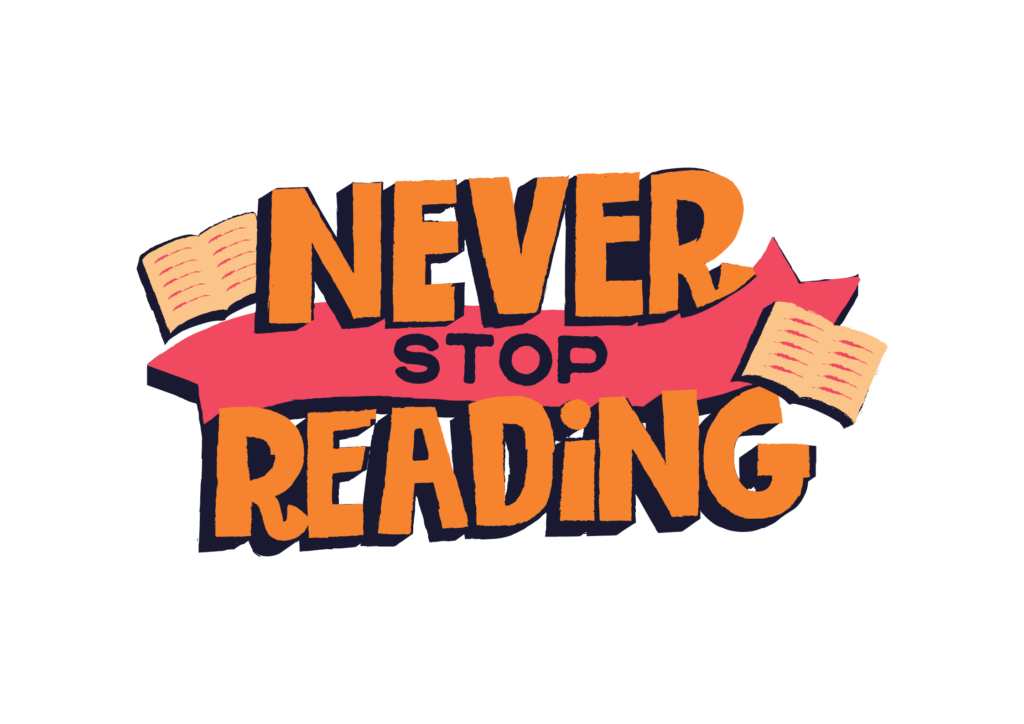
Let’s be honest reading finance books are not everyone’s cup of tea. We will shortly discuss a few non finance books that have helped me and a few people I know on our journeys to wealth. First I want to emphasise the power of reading.
Reading is something I enjoy doing. I’m currently in a book club with a few friends where we read one book a month and discuss the book together. I noticed that what the most “successful” people in the world tend to have in common is that they have a passion for reading.
Take for instance Warren Buffet, arguably one of the most successful investors in history, suggests:
“Read 500 pages…every day. That’s how knowledge works. It builds up, like compound interest. All of you can do it, but I guarantee not many of you will do it.”
His business partner Charlie Munger said this:
“I constantly see people rise in life who are not the smartest, sometimes not even the most diligent, but they are learning machines. They go to bed every night a little wiser than they were when they got up and boy does that help, particularly when you have a long run ahead of you.”
Book 1: Think Fast and Thinking slow:
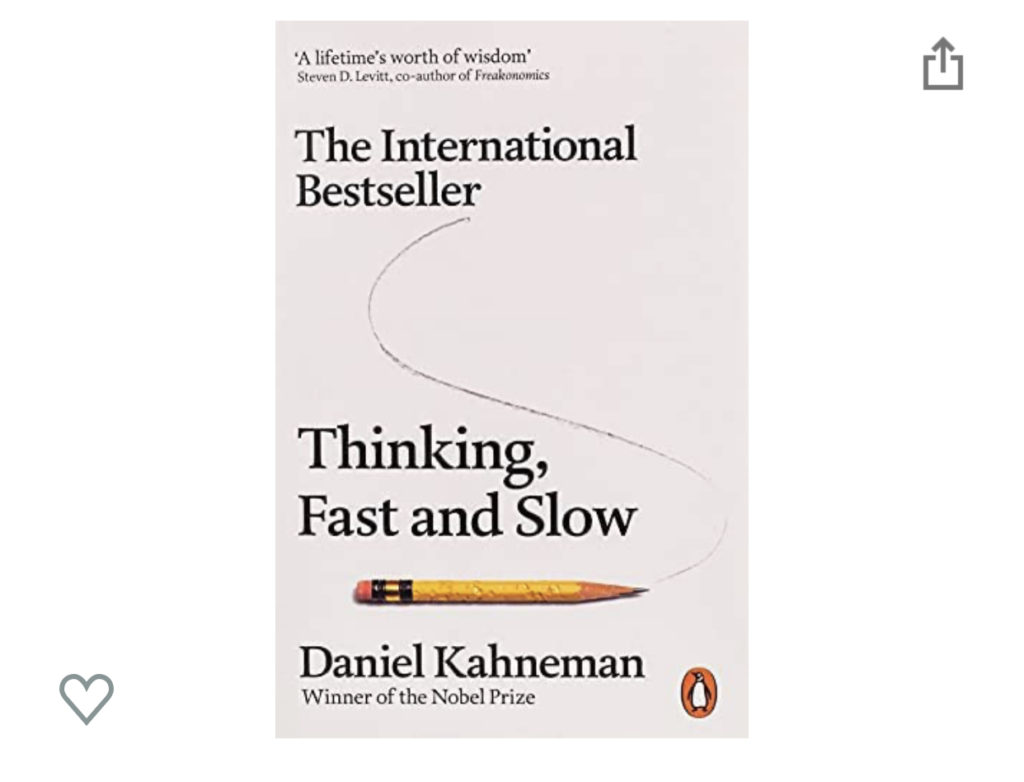
This book goes into depth on how we think and what goes through our thought process. Essentially, we have two thinking systems, system 1 and 2 which we’ll go through below:
What’s the difference between System 1 and 2.
System 1:
This is the intuitive system, the thinking system that doesn’t require much energy. Most people will know the answer to 1+1 without even thinking, that’s the kind of thinking that system 1 does.
System 2:
Our brain exerts more energy towards this kind of thinking, this is the thinking that solves complex equations. If you have ever had a task to do that requires concentration and focus, you’re more than likely using your system 2.
Application to finance:
In regard to our personal finances, I believe we can potentially apply both systems. My approach would be to first start with system 2. Mainly because it can help us establish where we need to improve on in our finances, i.e., whether it’s the bad spending habits, lack of disposable income and so forth. Once we have identified that aspect, system 2 can help us devise a plan to solve the issues that we have relating to our management of our finances. So much so that we’re able to manage our finances lifestyle in autopilot or subconscious mind where system 1 resides.
Lazy mind and thinking produces lazy results
System 1:
As a result of system 1 being very lax, it can consequently produce consistent errors and lazy results. Especially when applied to our day to day finances; if we consistently take a lax approach it can have a harmful effect to our, i.e. one can miss paying important day to day expenses and ultimately develop bad practices. This law is called ‘law of least effort’ and as a result this system uses minimal brain energy as possible.
System 2:
This thinking system on the other hand is probably more appropriate when it comes to being diligent, shrewd and prudent with our finances. Going through your monthly bank statements to identify any unfamiliar transactions and identifying areas to encourage saving or investing are probably an example of how system 2 can prevent you from having lazy thoughts towards your finances. If you have a financial goal in mind or you are perhaps financial planning it will require you to accurately forecast your salary (revenue) along with all the expenditures (costs, and profit/disposable income).
During my early years of my career as an accounts payable, we use to check the bank accounts of the company on a daily basis. It required me to concentrate for a sustained period of time ensuring there were no errors, a simple concept can be applied to our personal lives and money.
The benefits of this system:
- Helps you concentrate
- Better self-control: which can be applied to:
- Better Spending
- Better Saving
- Better Investing
- Better Intelligence
Summary:
There are two types of thinking systems, system 1 and system 2. System 1 is instinctive, doesn’t require much energy, system two is called upon for complex thinking. In regard to building wealth system 2 will need to be called on to identify where the leaks in our finances are and how we can fix them up.
Book 2: Atomic Habits:
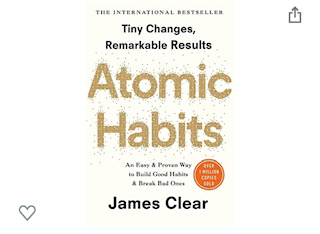
This book delves into how we can achieve wonderful things by making very small changes over time. They say “Rome wasn’t built in a day” suggesting the need for time to accomplish great things. My take from this book was how we can develop good habits within that time. Change doesn’t have to be revolutionary.
Implementation Intention:
As mention above on the previous book I use to log in to the company bank accounts to track and report the daily transactions of the company. On my quest to managing finance properly I wanted to replicate something similar to my personal life.
So I started off by downloading my banking apps on my phone and putting a reminder on my phone to check my bank balances every morning for 2 minutes or so. You may wonder what this does; for starters:
- I felt I was in control of my daily financials
- It helped me review my spending on a daily basis and constructively critique whether those spends were necessary.
- This helped me find opportunity to save money
- For example I noticed I was spending quite a bit on lunch so I decided to shop in bulk and do prep meals instead
- It also helps me to identify any fraudulent or unfamiliar transactions and swiftly query them
- My wife accidently had money taken out of her account twice by a company, had she not checked her bank account she wouldn’t have been able to spot this.
Habit Tracking:
The author goes on to talk about how we can track the progress of our new habits. The main one for me is having an accountability partner.
My accountability partners are my wife and a few friends. What this does, is it almost forces you to find a way hit your desired target. For example if your goal is to have x amount in the bank by the end of a certain period, it will force you to analyse and assess the variables that can hinder you meeting your goal and mitigating them as much as possible.
It may not be possible all the time to hit those targets, things happen but the aim is to try as hard as possible and have reasonable justification if you’re unable to. In one of my accountability circles the person who is unable to hit their target buys a drink for everyone! What a way to ensure you hit your target.
Habit Frictions
The author mentions two ways to change a habit with frictions:
- Increase friction: This can be used to kill bad habits
- Reduce friction: This can be used to create good habits
Increase friction:
The author suggests that if one wants to spend less time on the television, they should consider unplugging the television and taking out the batteries of the remote control. Reason being is because it’ll require much effort to watch television after you’ve done the above.
An effective way to apply this to finance is cut your credit card if you have one and once you’ve paid it off of course! A few conducive reasons behind this are:
- It can kill the ‘buy now pay later’ attitude, which has been known to cause financial problems
- This will introduce enough friction whereby you only spend money on what you need
- It can almost force one to live within their means
Reduce Friction
In addition to checking your bank account on a daily basis, another good way to reduce a friction on bad finance habits is to set up a recurring saving plan via a standing order. This enables you to put a small amount each month away. The amount can be small enough that it doesn’t stop you from living your day to day life, but each month it builds up and over time it can be rewarding.
Summary:
We are habitual creatures. The concept is to make small changes to ourselves that’s not noticeable and doesn’t require much will power as such, that over time can help us be the person or being we desire. Through small changes and consistency we can become anything.
Book 3: The Subtle Art of Not Giving A F*ck:
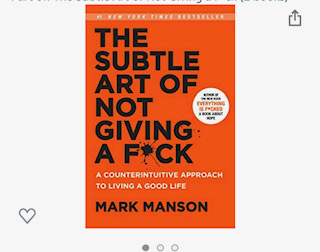
What’s Important in our lives?:
The author of the book starts off by indirectly questioning what matters to us the most. For example, whether it’s love, family, money. He urges us to essentially focus on these aspects of our lives and ultimately not give a f*ck about anything else, considering our energies are limited.
What do we want out of life?:
Similar to the above point, the author goes on to question what it is we want out of life. He believes that everything in life will be a struggle and challenge, whether it’s:
- Raising a family
- Becoming financially free
- Chasing our careers
As a result of this we must pick what we think we’ll be passionate about only because when the going gets tough as they say, our passion for it will get us through and manage the associated challenges.
For example as a Chartered Accountant if I wanted to become a Chief Financial Officer one day, I know that it may more than likely come with its’ challenges and sacrifices such as:
- Longer hours
- More meetings
- More challenging decisions to make
Hence my desire and passion to become a Chief Financial Officer has to be stronger than the potential challenges of becoming a Chief Financial Officer.
Acknowledgement:
Part of not giving a f*ck is acknowledging any bad habits one may have, addressing ones insecurities and having no self-denials. It’s probably one of the quickest ways to improve on any weaknesses you may have.
If one has bad money management for example, it will be good to identify why that may be the case. It could be due to:
- Spending habits
- Gambling
- Lack of organisation
- Etc
I think it’s a good starting point to seeing change, as you are being honest with yourself and it’s a very pragmatic approach.
Identity:
The author alludes to the fact that we attempt to protect our identities and we subconsciously give a f*ck about what people may think about us, apparently this can be costly.
If someone is known for being the type for ‘keeping up with the Jones’ the concept of financial freedom can threaten their identity. Hence they don’t try to change, it’s easier to protect their lavish habits and avoid change. This is called the ‘law of avoidance’
Simply because the journey to financial freedom will come with its sacrifices as discussed in the above points, and this threatens the image and identity of someone who lives above their means. ‘Keeping up with the Jones’ makes it difficult to save and invest. Equally saving and investing also makes it difficult to continue ‘keeping up with the Jones’.
What the author suggests here is to actually not give a f*ck what people may think. This is the first effective action, that way you’re free to start new habits that can peacefully get you to the end goal.
When it’s all said and done, your happiness should come from within and not what people think or believe.
Humans are terrified of death
They say the ‘two things certain in life are death and taxes’, not many people enjoy speaking about the latter, but unfortunately it’s something we all have to go through one day (apologies for the depressing statement).
The author feels that as a result of death humans subconsciously build businesses, seek fame, power and a legacy as we attempt to create a conceptual self that will live on after we pass away. We essentially try to live our mortal lives seeking immortality activities, things that will endure.
Inasmuch as we are trying to seek financial freedom, build generational wealth and create a legacy, the author goes on to conclude that we should focus on the now, enjoy life (not swinishly), spend time with friends and family and this is what enriches life, from a monetary and nonmonetary perspective.
Summary:
The Subtle Art of not giving a f*ck is essentially about identifying the things that are worth caring about, love, money, friends, family and ultimately not giving a f*ck about anything else in life as they are not part of our core values and beliefs.
Book 4: Mindset
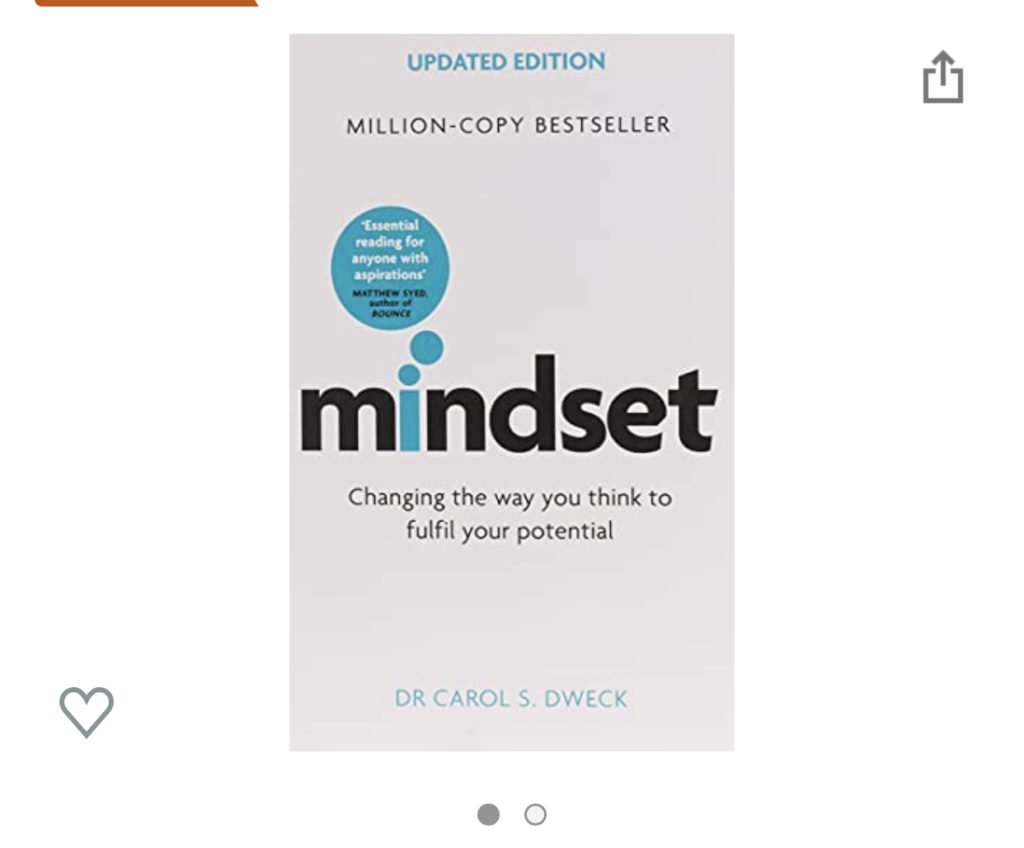
This fourth book goes into our mental attitudes and approach to life. The author goes on further to discuss the two different types of mindsets we have and how we can apply them.
- Growth Mindset
- Fixed Mindset
Growth Mindset
A growth mindset is simply having the attitude that you can pretty much become anything you put your mind to along with hard work. Hence people with this type of mindset essentially go on to develop new skills, life is about constantly involving for these kind of people. This pretty much favours nurture.
Fixed Mindset
A fixed mindset concept is where things are set in stone and they are what they are. It favours nature over nurture. People with this type of mindset believe that they can be good at certain thing (which they believe they’re born with) and incompetent at other things.
Disasters and Mindset
Unfortunately in life disasters do occur, but how we respond to them is important. On the topic of a financial disaster let’s take a look at how both mindsets work and are applied, based on their characteristics.
Growth Mindset
According to the author, people with this mindset see any potential disaster as opportunities. Their outlook on life is optimistic. From a personal finance perspective, this mindset helped me change my way of thinking to invest in companies who had temporary bad news in the media for one reason or another.
For example during the time I bought Under Armour shares (sportswear company) they had an accounting scandal. My thought process was:
- Will people stop buying their sports wear products because of it?
- Will the health conscious market be affected as a result of this?
My conviction was no on both questions and I saw this as an opportunity because I felt the share price of the company was cheap relative to what it was really worth. As a result I bought a stake in the company and made over 100% return!
Fixed Mindset
On the contrary people with this mindset don’t tend to believe that they can learn from their mistakes. They believe they are losers or winners.
Summary:
Growth Mindset frees your mind and helps you develop new skills along the way provided you put in the relevant work. A fixed mindset is an attitude that operates on the basis that things are the way they are and not much can be done about it.
Book 5: Switch
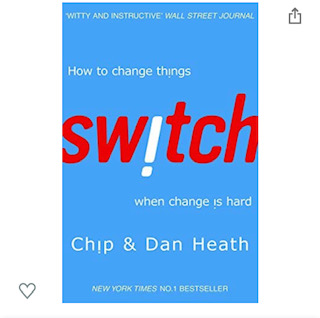
Our final book is Switch. If you ever feel resistance to change, this book can help.
The author does a good job in breaking down the two sides to us below, thereafter we’ll discuss how this can be applied to our journey to wealth.
- Elephant
- Rider
Elephant:
This is the emotional side of us that needs to be managed well by the riders. We need to evoke very powerful emotions to get the elephant moving in the right direction.
Rider:
This is the rational side that is responsible for directing our elephant side and utilising this to our advantage as much as possible
Script the vital moves for the Rider as it hates making decisions
I liken this to the term critical success factors. In other words what has to happen before you can measure success? On the journey to creating wealth, the rider can surrender to decision paralysis essentially where they struggle to make a decision about anything.
The remedy to this is to lay out all the critical moves for example for “get richer”, the rider will try to assess all the possibilities on how to do this: saving more, spending less, investing more etc. The rider will end up doing too much analysis and end no where due to the vagueness.
For building wealth, you’ll probably need to script a crucial move, on spending; “A portion of what you earn is yours to keep”
If one can afford to, perhaps each time you receive a paycheque, put some aside i.e. 10% as yours to keep, to invest in the future.
This done on a consistent basis over time can be huge. The concept is to put away something little that doesn’t drastically effect you and you don’t notice it, over time watch it grow!
Motivate the elephant with all your might!
Sometimes we can get lax and complacent, we’re humans after all. But if the rider can do a good job at knowing how and when to motivate the elephant even better.
Try and find a vivid, exciting and desirable goal for the elephant to remain motivated to get better with money. What is your why? Is it to worry less about what would happen if you lost your job, is it to build for a better future with your family or children, build more income streams, pay off your debts.
This burning desire and motivation can help you get out of bed each morning, and can help build momentum towards your financial goals. Treat this almost like your mission statement for yourself.
For example, Apple’s mission statement is “to bringing the best user experience to its customers through its innovative hardware, software, and services”. Yours can be “to provide the best future financial security through consistent savings and investments”.
This can help you get to work, and when going gets tough as they say, you’ll recite your mission statement and remember that you’re in it for the long run.
Summary
There are two sides to us, the rider (the rational thinker) and the elephant (the emotional aspect).The rider need to layout all the critical success factors pertaining to building wealth as clear as possible. The rider also need to motivate the elephant to staying focused and continue the hustle.
Final Thoughts
Reading physical books can take time and effort. I have recently started listening to audio books, I find this convenient when I’m driving, cycling or at the gym. It’s worth considering if you are someone that’s pressed for time to read a physical book.
Leave a Reply